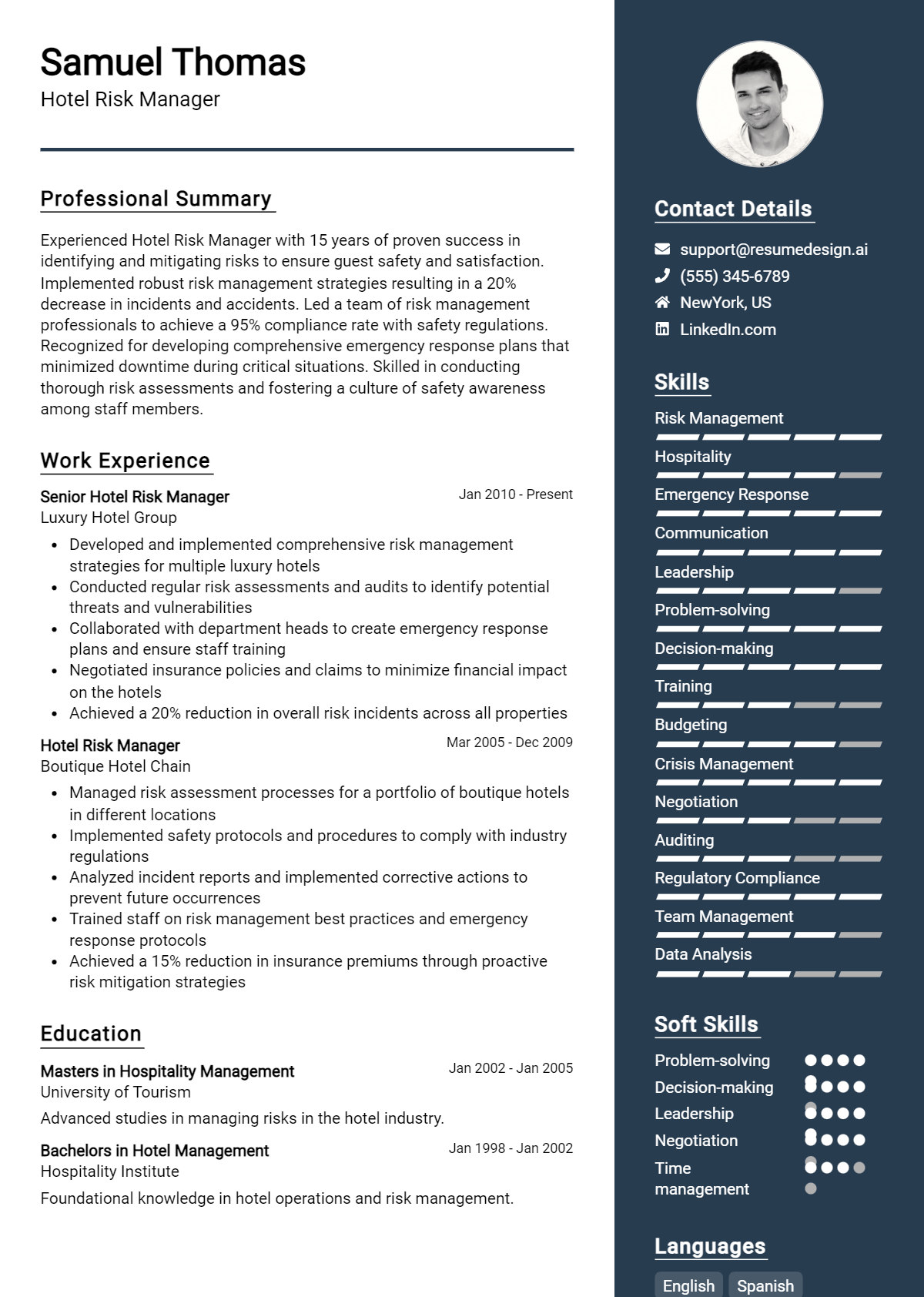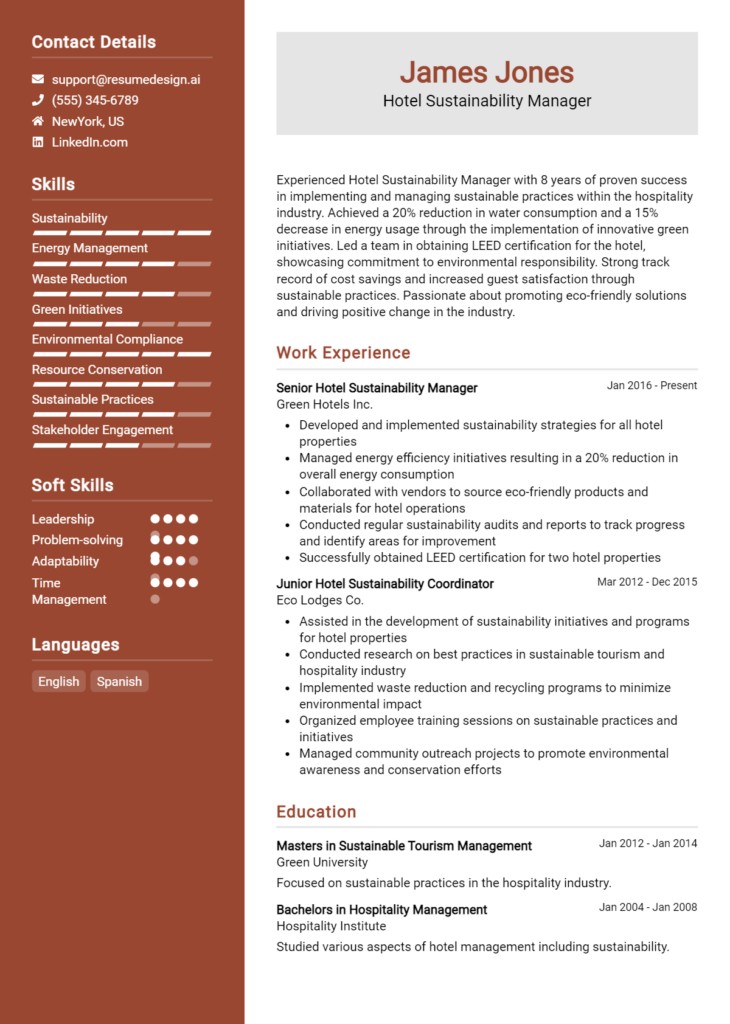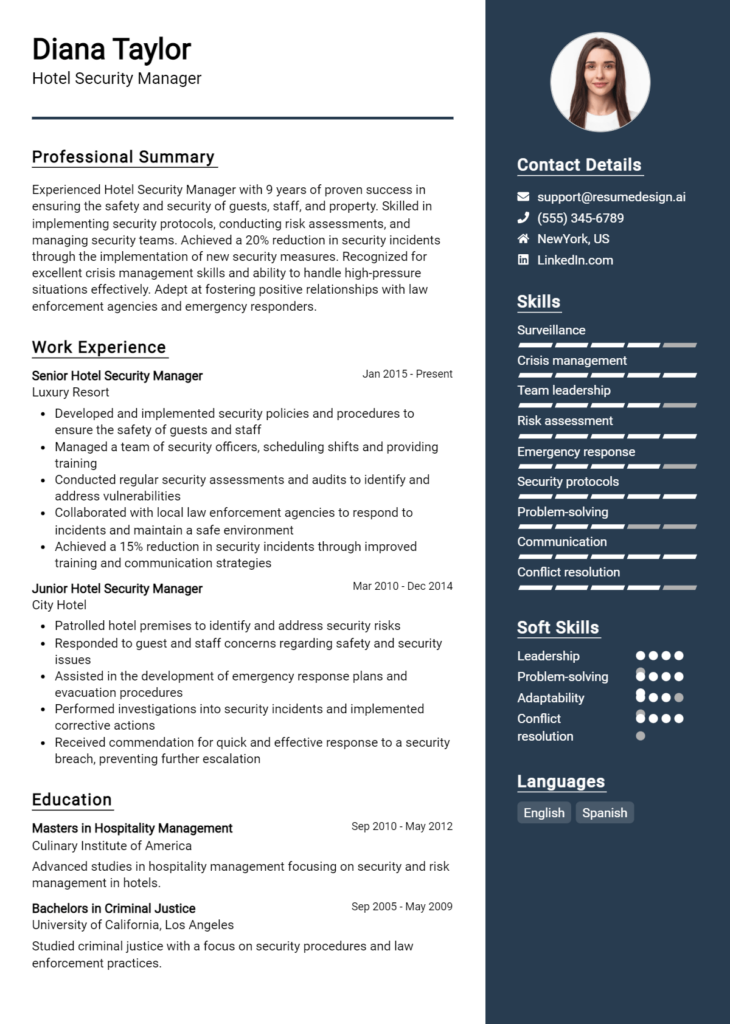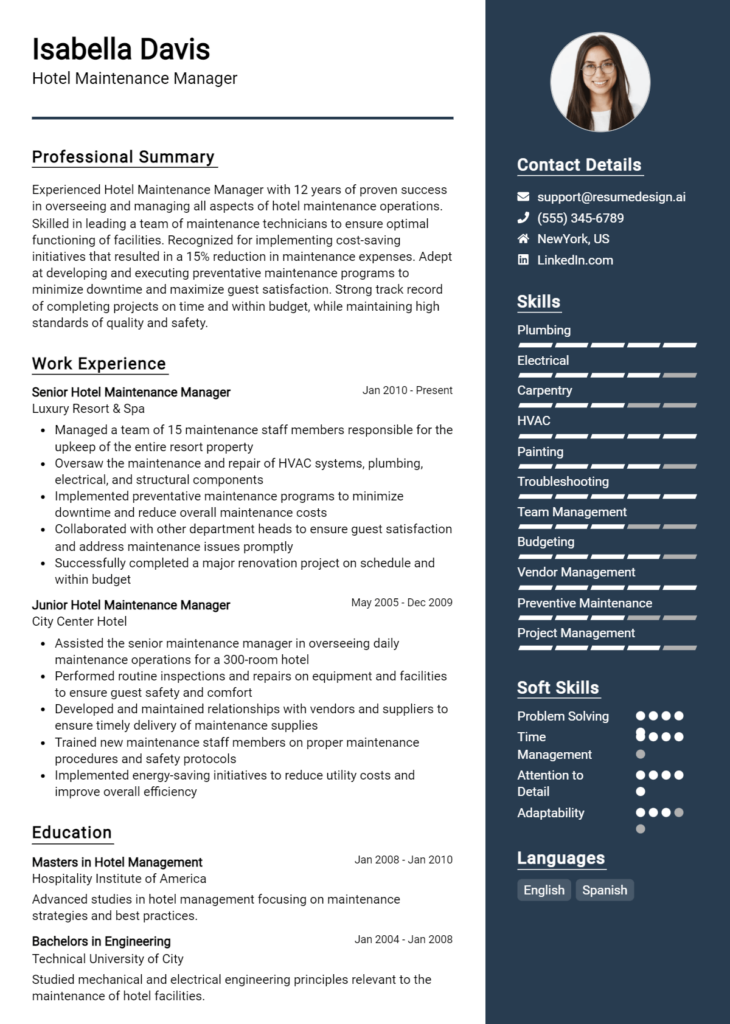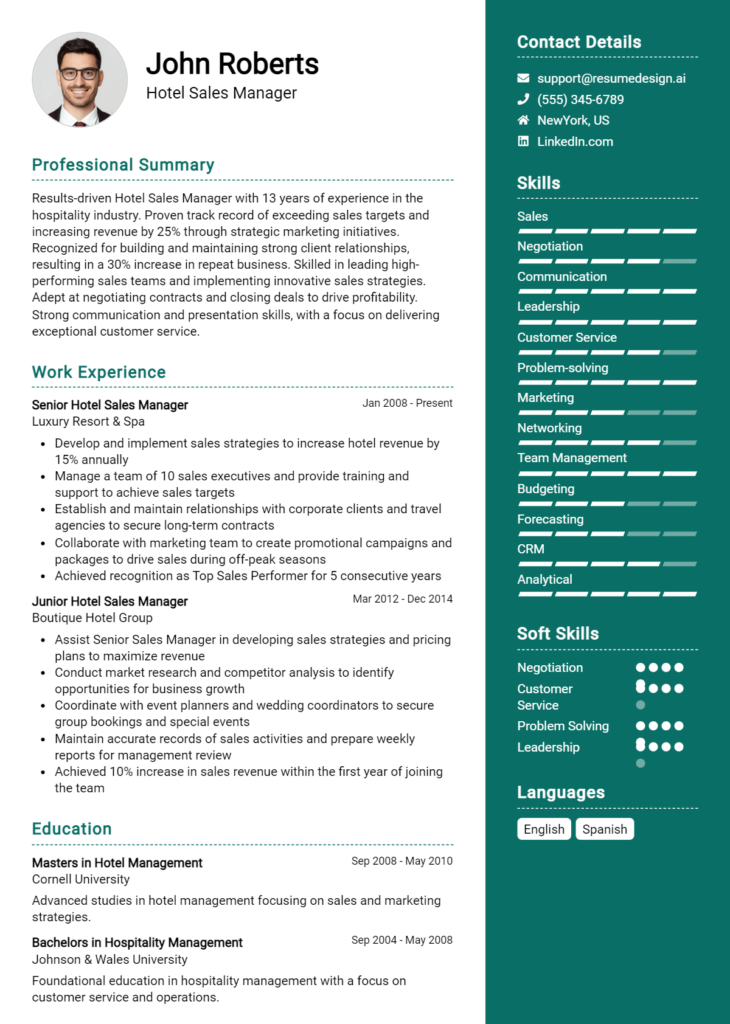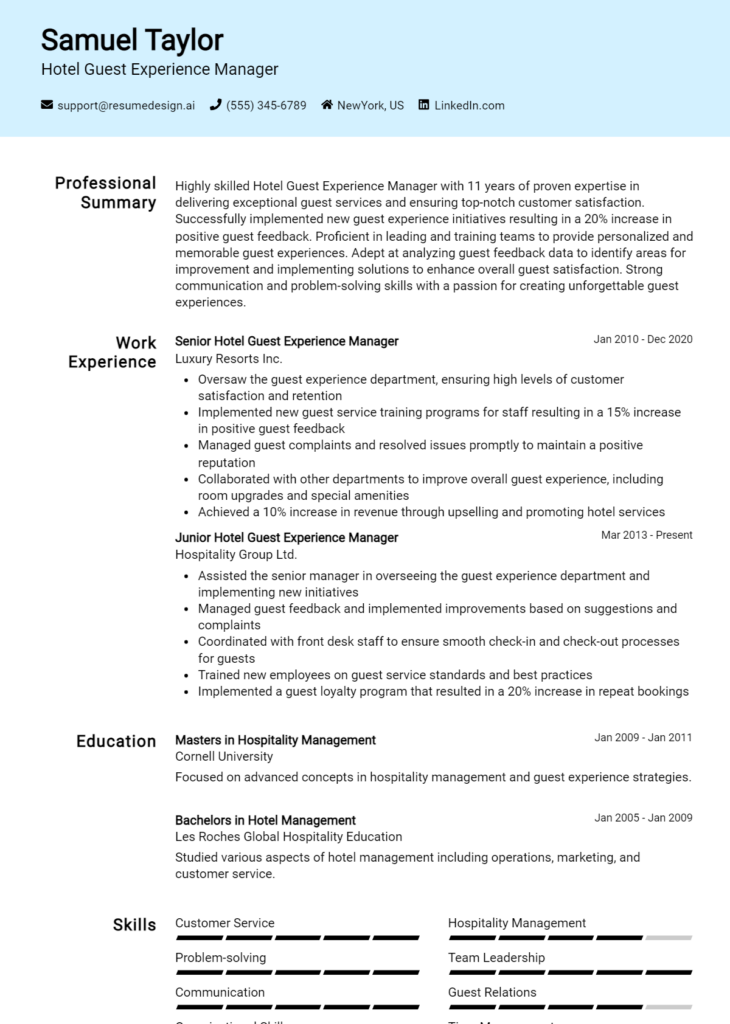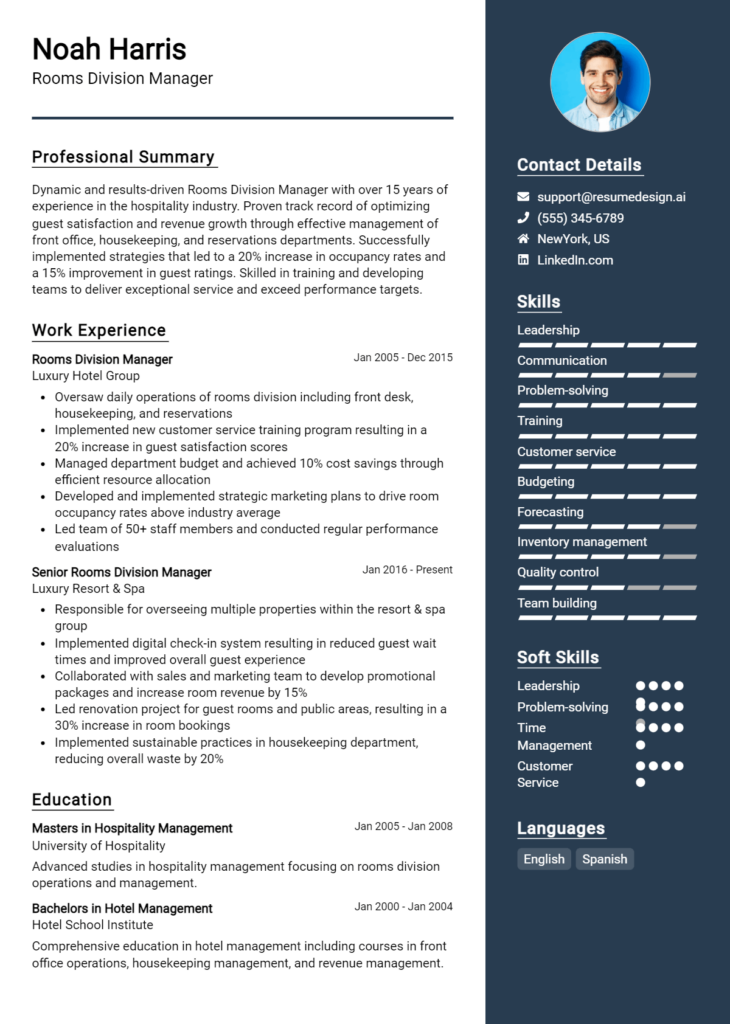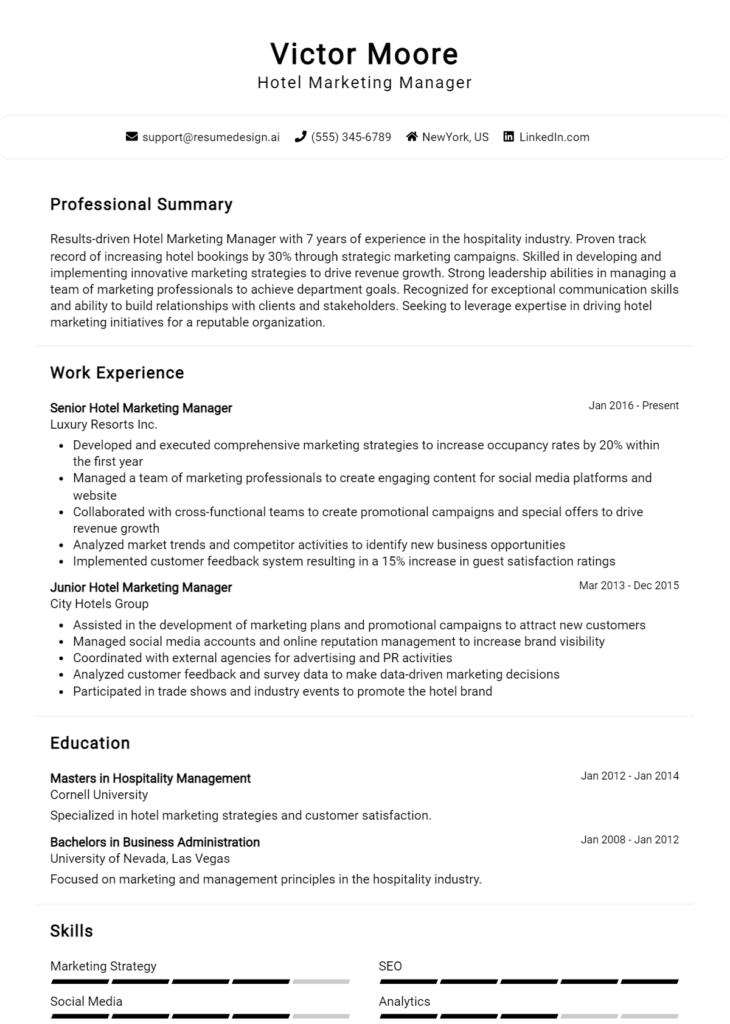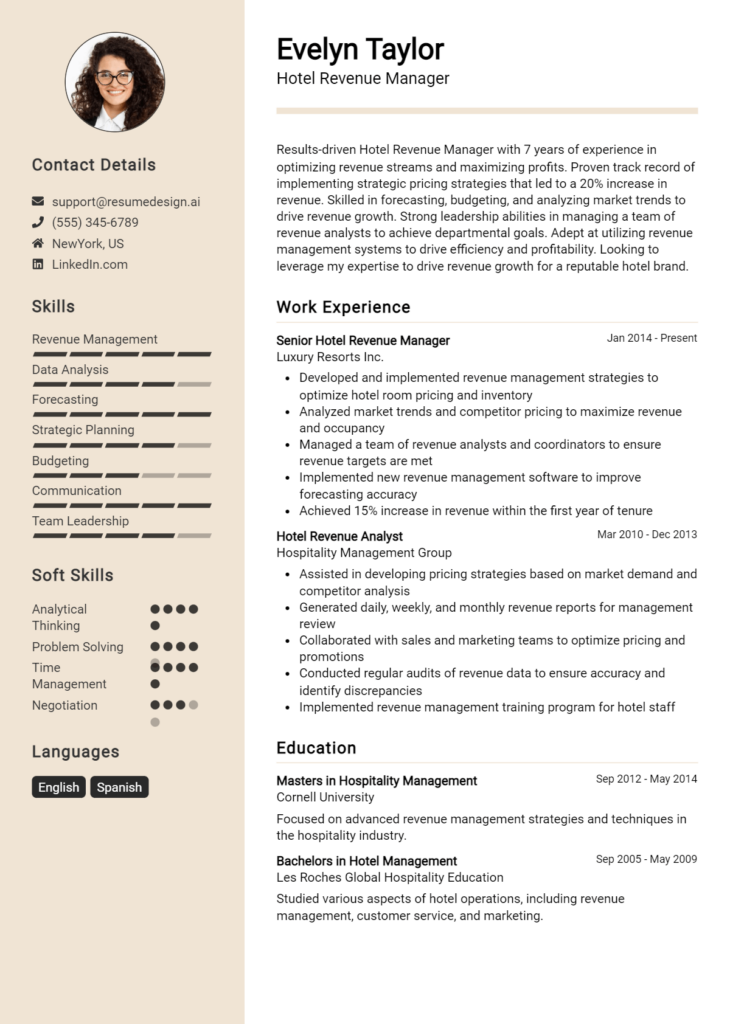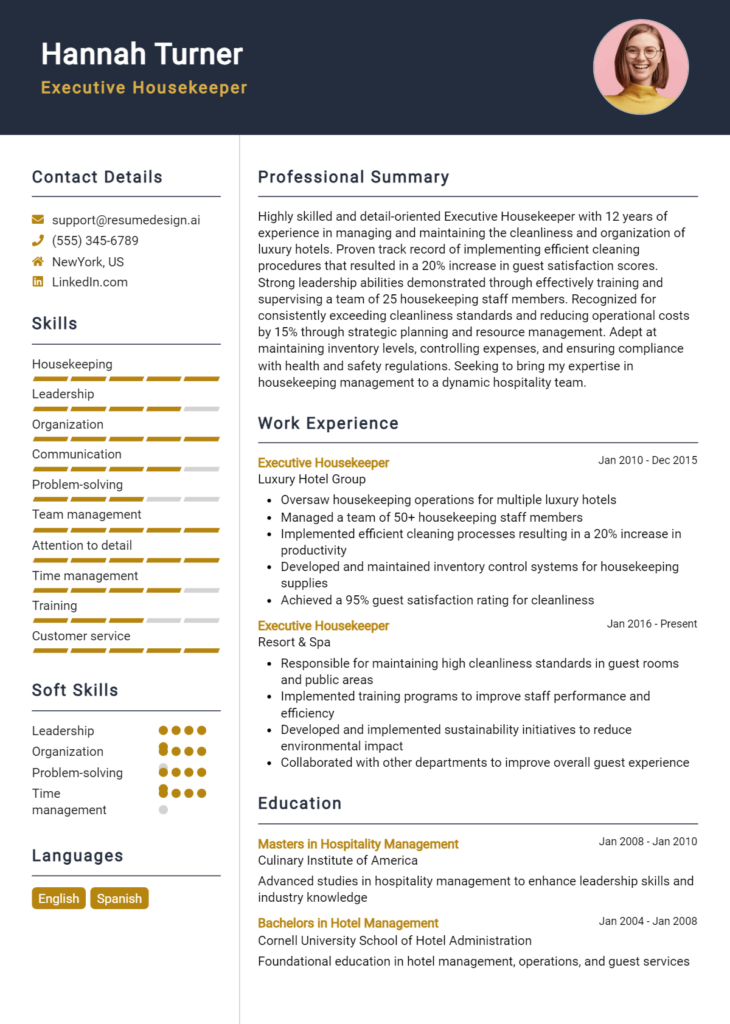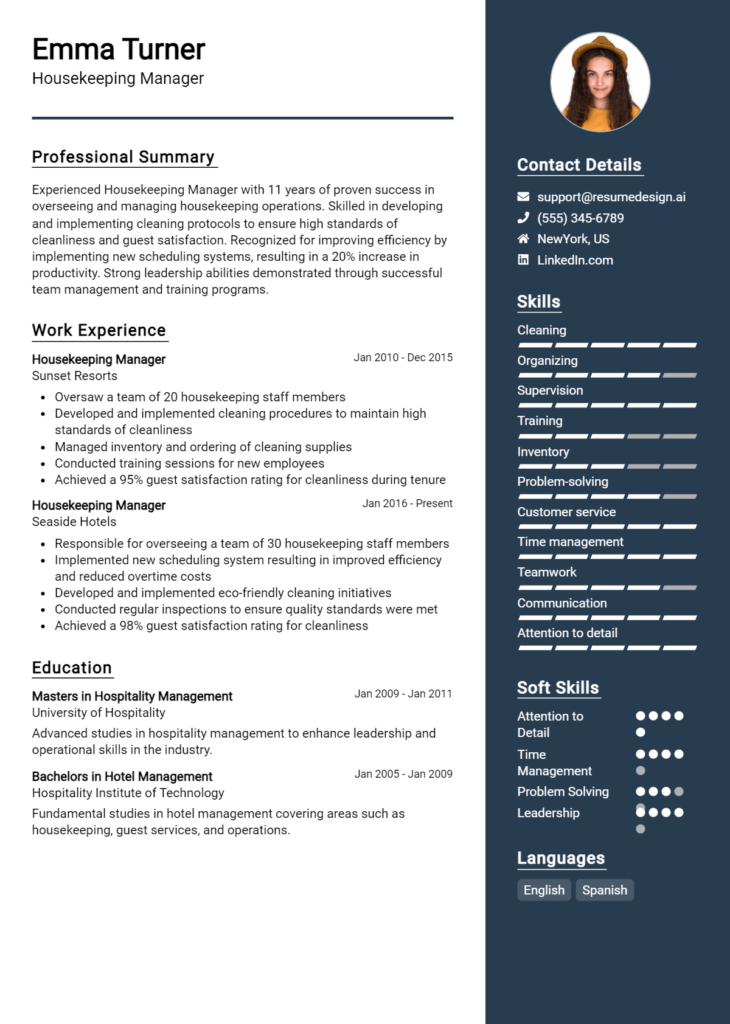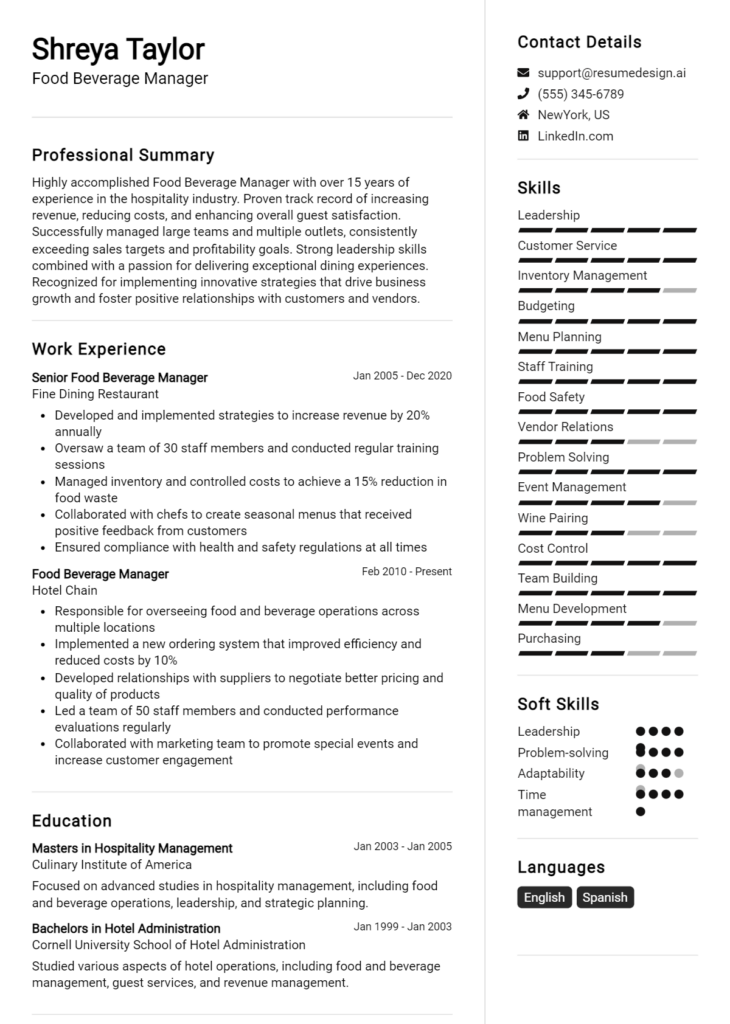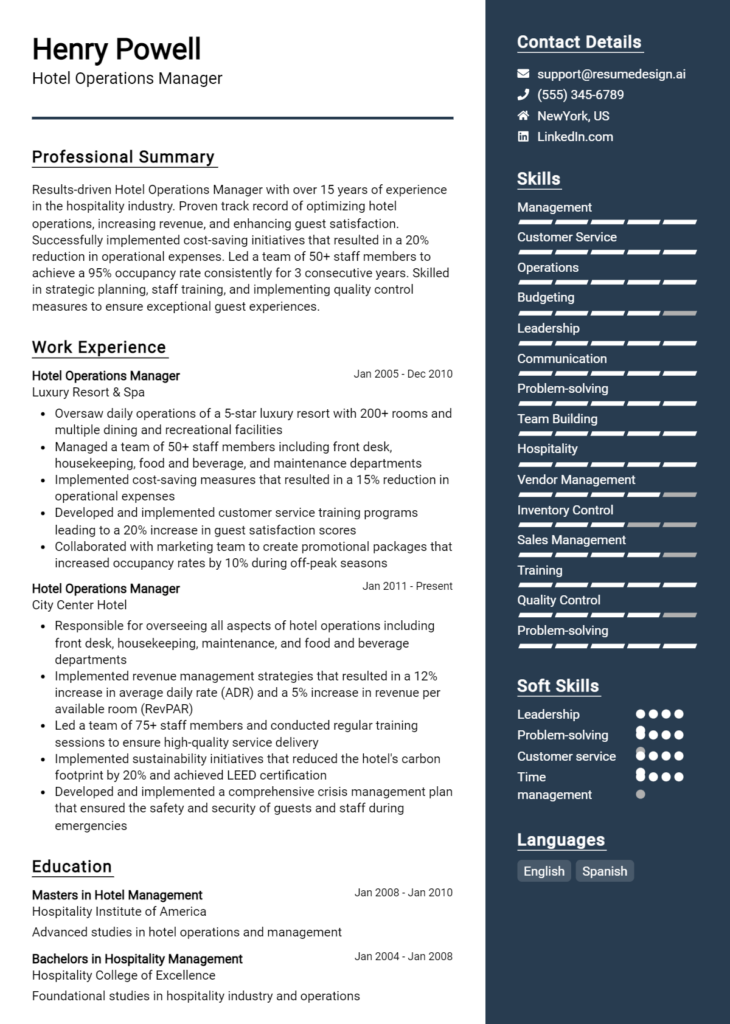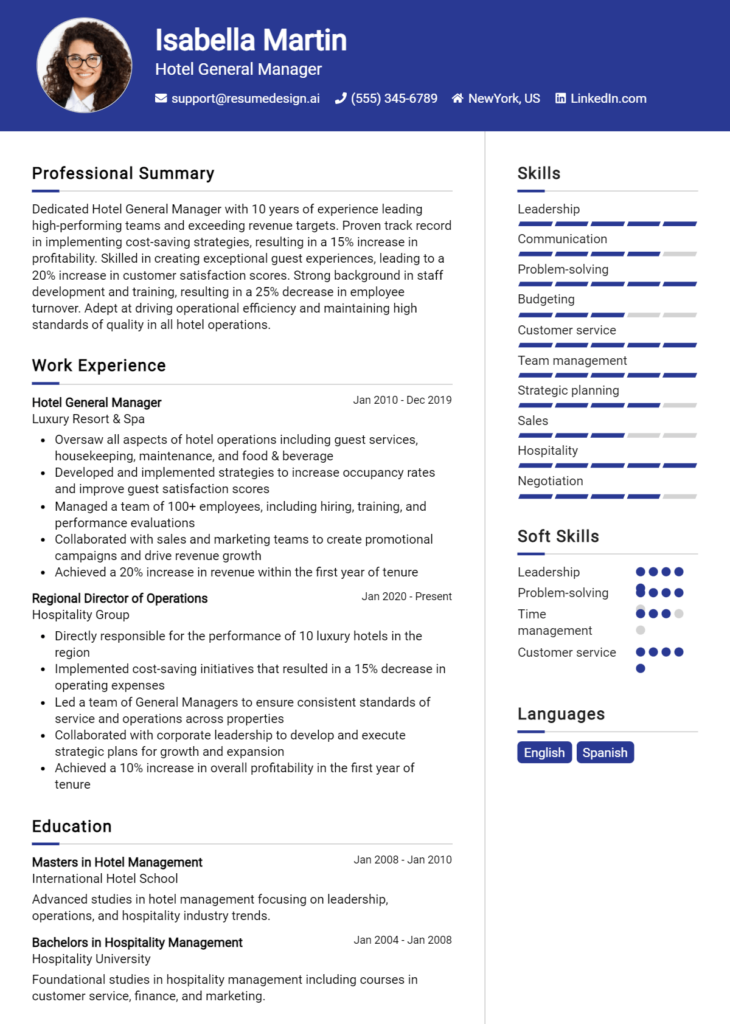Hotel Risk Manager Core Responsibilities
A Hotel Risk Manager plays a pivotal role in safeguarding the establishment by identifying, assessing, and mitigating potential risks. This position requires strong technical knowledge, operational insight, and exceptional problem-solving skills to effectively bridge various departments, including operations, finance, and human resources. A successful Hotel Risk Manager not only protects the organization from financial loss but also ensures compliance with safety regulations, contributing to the overall goals of the hotel. A well-structured resume can effectively showcase these qualifications, highlighting the candidate's ability to enhance operational efficiency and maintain guest satisfaction.
Common Responsibilities Listed on Hotel Risk Manager Resume
- Conducting regular risk assessments and audits across hotel operations.
- Developing and implementing risk management policies and procedures.
- Training staff on safety protocols and emergency response plans.
- Monitoring compliance with health, safety, and environmental regulations.
- Collaborating with department heads to identify and mitigate operational risks.
- Evaluating insurance coverage and claims management processes.
- Managing incident investigations and reporting findings to management.
- Staying updated on industry trends and regulatory changes affecting risk management.
- Preparing risk management reports for executive leadership.
- Coordinating with external agencies and consultants on risk-related matters.
- Implementing crisis management plans in response to emergencies.
- Engaging in continuous improvement initiatives to enhance safety standards.
High-Level Resume Tips for Hotel Risk Manager Professionals
In the competitive landscape of the hospitality industry, a well-crafted resume is essential for Hotel Risk Manager professionals looking to make a strong first impression. As the initial point of contact between candidates and potential employers, your resume must effectively reflect not only your skills and qualifications but also your achievements in risk management. A compelling resume can set you apart in a field where attention to detail and proactive problem-solving are paramount. This guide will provide practical and actionable resume tips specifically tailored for Hotel Risk Manager professionals, helping you to present your unique value proposition to prospective employers.
Top Resume Tips for Hotel Risk Manager Professionals
- Tailor your resume to each job description, ensuring that you highlight relevant skills and experiences that align with the specific requirements of the position.
- Showcase your relevant experience in risk management, including roles that emphasize your ability to identify, assess, and mitigate risks within hotel operations.
- Quantify your achievements by including specific metrics or outcomes, such as reduced insurance costs, improved safety ratings, or successful risk assessments.
- Highlight industry-specific skills, such as knowledge of safety regulations, compliance requirements, and crisis management strategies that are pertinent to the hospitality sector.
- Use action verbs to convey your responsibilities and accomplishments, making your contributions clear and impactful.
- Include any relevant certifications or training, such as Certified Risk Management Professional (CRMP) or training in hospitality safety standards.
- Incorporate keywords from the job posting to pass through applicant tracking systems and capture the attention of hiring managers.
- Maintain a clean and professional format, ensuring that your resume is easy to read and visually appealing.
- Keep your resume concise, ideally one to two pages, focusing on the most relevant experiences and skills that demonstrate your qualifications as a Hotel Risk Manager.
By implementing these tips, you can significantly increase your chances of landing a job in the Hotel Risk Manager field. A well-structured and tailored resume not only highlights your expertise but also demonstrates your commitment to excellence in risk management, making you an attractive candidate to potential employers in the hospitality industry.
Why Resume Headlines & Titles are Important for Hotel Risk Manager
In the competitive landscape of the hospitality industry, a Hotel Risk Manager plays a critical role in identifying, assessing, and mitigating potential risks that could impact hotel operations and guest safety. A well-crafted resume headline or title is crucial for candidates aspiring to this position, as it serves as the first impression to hiring managers. A strong headline immediately grabs attention and succinctly summarizes the candidate’s key qualifications in a single impactful phrase, making it easier for employers to recognize their suitability for the role. Therefore, it is essential that the resume headline is concise, relevant, and directly aligned with the job being applied for, setting the tone for the rest of the resume.
Best Practices for Crafting Resume Headlines for Hotel Risk Manager
- Keep it concise—aim for one impactful phrase.
- Use specific terminology relevant to the Hotel Risk Manager role.
- Highlight key qualifications or strengths that differentiate you.
- Incorporate metrics or achievements when possible to add credibility.
- Avoid generic terms; tailor the headline to the specific job description.
- Utilize action verbs to convey a sense of proactivity and expertise.
- Reflect your unique value proposition to capture employer interest.
- Ensure it aligns with the overall tone and content of your resume.
Example Resume Headlines for Hotel Risk Manager
Strong Resume Headlines
Experienced Hotel Risk Manager Specializing in Operational Safety and Compliance
Proven Track Record in Risk Mitigation Strategies for Luxury Hospitality
Dynamic Risk Management Professional with 10+ Years in Hospitality
Weak Resume Headlines
Hotel Manager
Risk Management Professional
Strong headlines are effective because they immediately convey the candidate’s expertise and relevance to the Hotel Risk Manager role, showcasing specific skills and achievements that are likely to resonate with hiring managers. In contrast, weak headlines fail to impress due to their vagueness and lack of specificity, leaving employers unclear about the candidate's unique qualifications or relevance to the position. A compelling headline sets a positive tone for the resume and encourages hiring managers to read further, while a generic headline may lead to missed opportunities.
Writing an Exceptional Hotel Risk Manager Resume Summary
A resume summary is a critical component for a Hotel Risk Manager, as it serves as the first impression for hiring managers. A well-crafted summary quickly captures attention by succinctly showcasing the candidate’s key skills, relevant experience, and noteworthy accomplishments tailored to the specific role. In an industry where risk management is paramount to ensuring guest safety and operational efficiency, a concise and impactful summary can set a candidate apart from the competition, making it essential for success in the application process.
Best Practices for Writing a Hotel Risk Manager Resume Summary
- Quantify Achievements: Use specific numbers and metrics to demonstrate the impact of your contributions.
- Focus on Skills: Highlight key skills that are particularly relevant to risk management in the hospitality sector.
- Tailor for the Job: Customize your summary to reflect the requirements and language used in the job description.
- Be Concise: Keep your summary brief, ideally within 3-5 sentences, to maintain the reader's attention.
- Showcase Relevant Experience: Emphasize your experience dealing with risk assessments, compliance, and crisis management.
- Use Strong Action Verbs: Start sentences with powerful verbs that convey your proactive approach and leadership in the role.
- Highlight Certifications: If applicable, mention any relevant certifications or training that enhance your qualifications.
- Reflect Professionalism: Ensure your tone is professional, confident, and aligns with the hospitality industry's standards.
Example Hotel Risk Manager Resume Summaries
Strong Resume Summaries
Detail-oriented Hotel Risk Manager with over 8 years of experience in identifying and mitigating risks, resulting in a 30% reduction in insurance claims and improved safety protocols across three properties.
Proven track record in crisis management and compliance, successfully leading risk assessments that decreased incident reports by 25% while enhancing guest satisfaction ratings by 15%.
Skilled in developing and implementing comprehensive risk management strategies, achieving a 40% increase in operational efficiency and securing a 95% guest safety satisfaction score.
Dynamic and proactive risk management professional with a focus on hospitality, instrumental in training staff on safety procedures that resulted in a 50% decrease in workplace accidents.
Weak Resume Summaries
Experienced risk manager looking for a position in a hotel where I can apply my skills.
I have worked in risk management for several years and have handled various tasks related to safety and compliance.
The strong resume summaries are effective because they provide specific, quantifiable outcomes that demonstrate the candidate's impact in previous roles, aligning closely with the expectations of the Hotel Risk Manager position. In contrast, the weak summaries lack detail and clarity about the candidate's achievements and skills, making them too generic to stand out in a competitive job market.
Work Experience Section for Hotel Risk Manager Resume
The work experience section of a Hotel Risk Manager resume is crucial as it provides a comprehensive view of the candidate's qualifications and expertise. This section not only highlights technical skills essential for managing risks within a hotel environment but also demonstrates the candidate's ability to lead teams and deliver high-quality safety and operational protocols. Furthermore, quantifying achievements through specific metrics and aligning experiences with industry standards is vital to showcase the candidate's effectiveness and reliability in risk management roles.
Best Practices for Hotel Risk Manager Work Experience
- Emphasize relevant technical skills such as risk assessment, compliance management, and crisis response.
- Quantify achievements with metrics, such as percentage reductions in incidents or cost savings from risk mitigation strategies.
- Highlight collaborative projects that demonstrate the ability to work with various departments and external stakeholders.
- Include specific examples of risk management plans developed or implemented and their outcomes.
- Showcase leadership roles in training staff on safety protocols and emergency procedures.
- Align experience descriptions with industry standards and best practices to reflect familiarity with current trends and regulations.
- Use action verbs to convey a sense of initiative and proactive management.
- Provide context for achievements to illustrate the challenges faced and how they were overcome.
Example Work Experiences for Hotel Risk Manager
Strong Experiences
- Developed and implemented a comprehensive risk management program that reduced incident rates by 30% over two years, significantly enhancing guest safety.
- Led a cross-departmental team in a successful crisis management drill, resulting in a 40% improvement in response times during emergency scenarios.
- Conducted risk assessments that identified potential vulnerabilities, leading to a $150,000 annual savings through targeted improvements in safety protocols.
- Trained 100+ staff members on emergency procedures, increasing overall compliance with safety standards to 95% within one year.
Weak Experiences
- Worked on safety initiatives that were somewhat successful.
- Participated in meetings about risk management strategies.
- Assisted with compliance audits occasionally.
- Helped develop safety protocols without clear results.
The examples provided illustrate the distinguishing characteristics of strong versus weak experiences. Strong experiences are specific, quantifiable, and demonstrate a clear impact on safety and risk management within a hotel setting. They showcase leadership, collaboration, and tangible results, which are essential for a Hotel Risk Manager. In contrast, weak experiences lack detail and specificity, making them unimpressive and failing to convey the candidate's true capabilities and contributions to risk management efforts.
Education and Certifications Section for Hotel Risk Manager Resume
The education and certifications section in a Hotel Risk Manager resume is a critical component that showcases a candidate's academic background and commitment to professional development. This section not only highlights the formal education attained but also emphasizes any industry-relevant certifications and continuous learning efforts that enhance one’s expertise in risk management. By providing details about relevant coursework, certifications, and specialized training, candidates can significantly bolster their credibility and demonstrate their alignment with the specific demands of the Hotel Risk Manager role.
Best Practices for Hotel Risk Manager Education and Certifications
- Include degrees in fields such as hospitality management, business administration, or risk management to establish a strong academic foundation.
- List industry-recognized certifications like Certified Risk Manager (CRM) or Certified Hospitality Risk Manager (CHRM) to validate your expertise.
- Highlight relevant coursework such as risk assessment, crisis management, or safety regulations to demonstrate specialized knowledge.
- Keep the information up to date by including any recent training or certifications that reflect current industry standards.
- Use clear and concise language to describe your qualifications, making it easy for hiring managers to understand your expertise.
- Prioritize the most relevant educational experiences and certifications that directly pertain to the hotel and hospitality industry.
- Consider including professional development workshops or seminars that showcase ongoing commitment to learning and industry engagement.
- Organize the section in reverse chronological order to highlight the most recent and relevant qualifications first.
Example Education and Certifications for Hotel Risk Manager
Strong Examples
- Bachelor of Science in Hospitality Management, University of XYZ
- Certified Risk Manager (CRM), Risk Management Society
- Advanced Risk Management Strategies, Online Professional Development Course
- Master’s Degree in Business Administration with a concentration in Risk Management, ABC University
Weak Examples
- High School Diploma, XYZ High School
- Certification in Basic First Aid (outdated and not industry-specific)
- Course in General Business Practices (not focused on risk management)
- Certificate in Hospitality Management from an unaccredited institution
The examples provided illustrate the distinction between strong and weak qualifications for a Hotel Risk Manager. Strong examples reflect relevant and advanced educational achievements and certifications that directly support the responsibilities of the role. In contrast, weak examples include outdated or irrelevant qualifications that do not contribute to the candidate’s expertise in risk management within the hotel industry. This differentiation highlights the importance of tailoring education and certification details to align with the specific demands of the position.
Top Skills & Keywords for Hotel Risk Manager Resume
In the competitive landscape of the hospitality industry, a Hotel Risk Manager plays a pivotal role in ensuring the safety and security of hotel operations, staff, and guests. A well-crafted resume that highlights relevant skills is essential for standing out in this field. Skills not only showcase a candidate's qualifications but also reflect their ability to navigate the complexities of risk management effectively. By emphasizing both hard and soft skills, a Hotel Risk Manager can demonstrate their comprehensive understanding of the industry's demands and their readiness to mitigate potential risks, ensuring a safe environment for all.
Top Hard & Soft Skills for Hotel Risk Manager
Soft Skills
- Strong communication abilities
- Problem-solving mindset
- Leadership and team management
- Conflict resolution
- Attention to detail
- Adaptability and flexibility
- Customer service orientation
- Time management
- Critical thinking
- Emotional intelligence
Hard Skills
- Knowledge of risk assessment methodologies
- Proficiency in safety compliance regulations
- Familiarity with crisis management protocols
- Experience in incident reporting and analysis
- Budgeting and financial management
- Proficient in data analysis tools
- Understanding of insurance policies and coverage
- Risk mitigation strategies
- Training and development in safety procedures
- Familiarity with emergency response planning
For a successful skills section in your resume, it’s crucial to combine these soft and hard skills effectively. Additionally, ensure that your work experience highlights how you have applied these skills in real-world situations, further increasing your appeal to potential employers.
Stand Out with a Winning Hotel Risk Manager Cover Letter
Dear [Hiring Manager's Name],
I am writing to express my interest in the Hotel Risk Manager position at [Hotel/Company Name], as advertised on [where you found the job posting]. With a robust background in risk management within the hospitality sector, coupled with my strong analytical skills and a proactive approach to safety protocols, I am excited about the opportunity to contribute to your esteemed establishment. My experience in identifying potential risks, implementing effective mitigation strategies, and ensuring compliance with industry standards positions me as a strong candidate to enhance your hotel’s operational integrity.
In my previous role at [Previous Company Name], I successfully developed and executed a comprehensive risk management program that reduced incidents by 30% over two years. By conducting thorough risk assessments and engaging staff training sessions on best practices, I was able to foster a culture of safety and awareness throughout the organization. My ability to collaborate with cross-functional teams ensures that risk management is embedded in every aspect of hotel operations, from guest services to maintenance protocols. Additionally, my experience in navigating insurance claims and negotiating with vendors has enabled me to manage costs effectively while maintaining high safety standards.
I am particularly drawn to this role at [Hotel/Company Name] because of your commitment to providing exceptional guest experiences while prioritizing safety. I admire your proactive approach to risk assessment and am eager to bring my expertise in developing innovative strategies that align with your vision. I am confident that my passion for the hospitality industry and my dedication to risk management will make a positive impact on your team.
Thank you for considering my application. I look forward to the opportunity to discuss how I can contribute to the safety and success of [Hotel/Company Name]. Please feel free to contact me at [your phone number] or [your email address] to schedule a conversation.
Sincerely,
[Your Name]
Common Mistakes to Avoid in a Hotel Risk Manager Resume
Crafting a resume for a Hotel Risk Manager position requires careful attention to detail, as this role demands a high level of professionalism and expertise in risk assessment and management. However, many candidates make common mistakes that can undermine their chances of landing an interview. By avoiding these pitfalls, you can create a more effective and compelling resume that highlights your qualifications and experience.
Lack of Specificity: Failing to provide specific examples of risk management projects or initiatives can make your resume vague. Highlight measurable outcomes and particular challenges you addressed.
Overlooking Relevant Experience: Many candidates neglect to include all relevant experience, such as internships or volunteer roles in risk-related positions. Even if they were not full-time roles, these experiences can demonstrate your commitment and capability.
Ignoring Industry Terminology: Using generic language instead of industry-specific terms can make your resume less impactful. Familiarize yourself with the terminology commonly used in hotel risk management to show your expertise.
Neglecting Soft Skills: While technical skills are crucial, overlooking the importance of soft skills like communication, problem-solving, and leadership can limit your appeal. Ensure to highlight these skills as they are essential for managing risks effectively.
Poor Formatting: A cluttered or unprofessional format can detract from your qualifications. Use a clean, organized layout that enhances readability and emphasizes your strengths.
Failing to Tailor the Resume: Sending out a generic resume without tailoring it to the specific job description can lead to missed opportunities. Customize your resume to reflect the requirements and responsibilities outlined in the job posting.
Omitting Certifications and Training: If you have relevant certifications, such as Certified Risk Manager (CRM) or Certified Safety Professional (CSP), be sure to include them. These credentials can significantly enhance your credibility.
Neglecting to Proofread: Spelling and grammatical errors can convey a lack of attention to detail, which is critical in risk management. Always proofread your resume multiple times or consider having someone else review it for errors.
Conclusion
As a Hotel Risk Manager, your role is crucial in safeguarding the hotel against potential risks while ensuring the safety and satisfaction of guests and staff. Throughout this article, we explored the essential skills, responsibilities, and best practices that define an effective risk management strategy in the hospitality industry.
Key points covered include:
- Understanding Risk Assessment: A comprehensive approach to identifying, analyzing, and mitigating various risks, including safety hazards, financial liabilities, and reputational threats.
- Crisis Management Planning: The importance of having a robust plan in place to respond effectively to emergencies, thereby minimizing disruptions and protecting the hotel's reputation.
- Training and Development: The necessity of training staff to recognize and respond to risks, fostering a culture of safety and awareness within the hotel environment.
- Compliance and Regulations: Staying informed about legal requirements and industry standards to ensure the hotel operates within the law and adheres to best practices.
In conclusion, if you are a Hotel Risk Manager looking to enhance your career or transition to a new opportunity, now is the time to review and update your resume. Highlight your expertise in risk management and showcase your accomplishments effectively.
To assist you in this process, consider utilizing tools like resume templates, which can provide a professional layout; a resume builder to streamline your creation process; resume examples for inspiration; and cover letter templates to complement your application. Take action today and position yourself as a top candidate in the competitive hospitality industry!

